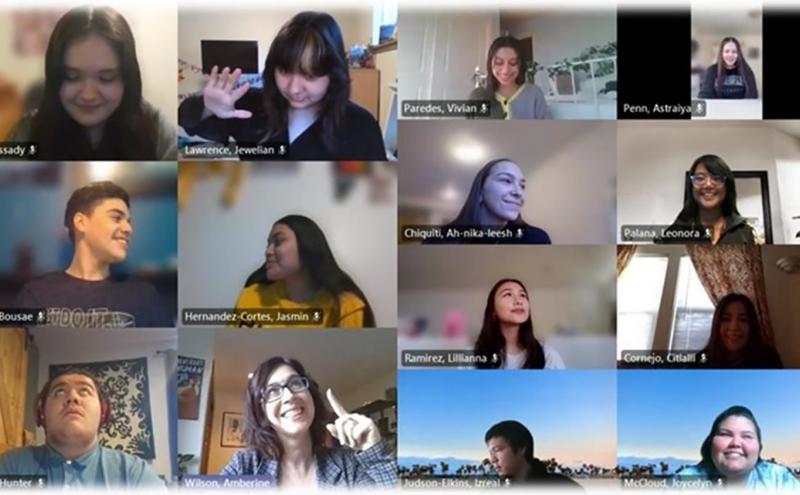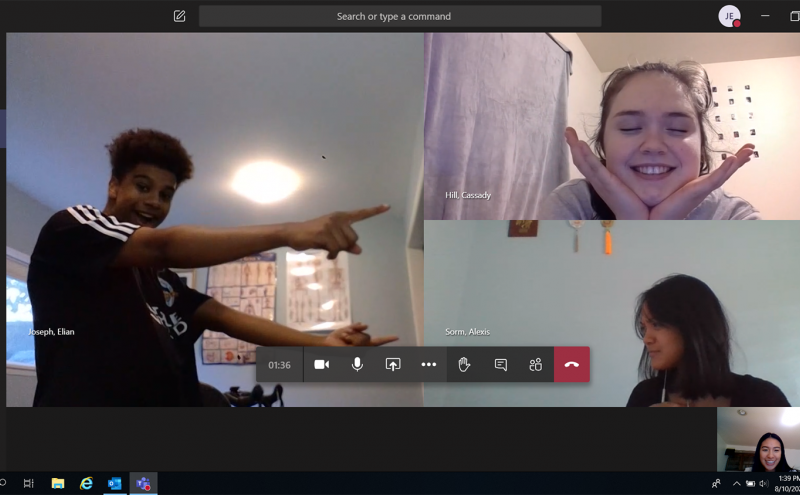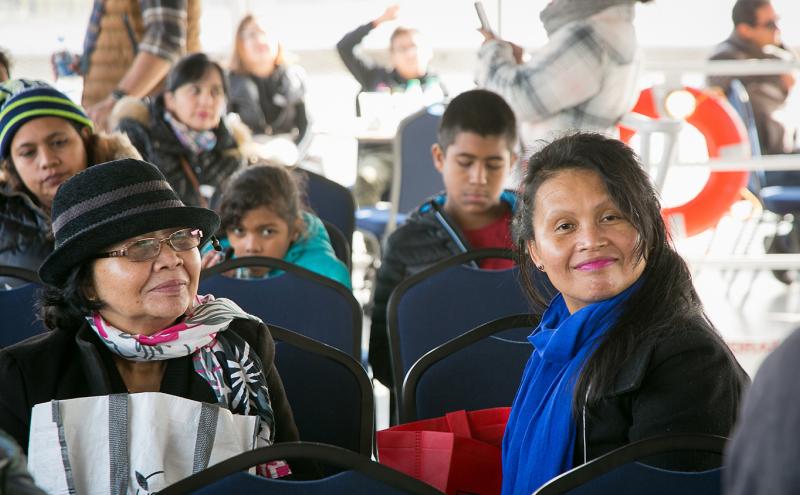
As COVID-19 changed every aspect of our lives, we learned to shift school, work, and social activities to an online format. At the same time, businesses and organizations began to reimagine many of their policies and programs in a virtual world.
To support youth in communities most impacted by COVID-19, in 2020 the Port evolved its in-person high school summer internship program into a virtual year-round program centered in project-based learning, recruiting from communities in zip codes furthest from opportunity that continue to experience disproportionate impacts from the pandemic.
High school interns can now earn a paycheck and school credit throughout the year while participating in hands-on projects that add value to the Port. They are able to network, explore different career paths in Port-related industries, and develop their skillset.
By shifting the focus of the program, the Port continues to prioritize youth internships, support an equitable economic recovery in the region, and draw young people to Port careers. This innovative approach to internships was developed in response to the COVID-19 crisis, but the Port plans to move forward with this model even after the pandemic is over.
"We have made incredible progress since making a commitment to vastly expand opportunities for youth at the Port of Seattle," said Commissioner Stephanie Bowman. "Since 2016, we’ve provided internships for more than 619 high school and college students from the most under-served communities in King County. Through the creativity and passion of our interns and Port staff, we are introducing these young people to well-paying Port careers with growth potential. By evolving to meet the needs of our community, our program has become a model for public sector organizations for leading change and expanding economic opportunity."
Increasing impact
During the summer of 2020, the Port hired nearly 80 high school interns supervised by the Port’s Human Resource team and led by Port Emerging Talent Manger Amberine Wilson.
To make the hiring process more equitable and the program more targeted to those in need, the Port used a community-based selection process, collaborating with equity-focused community partners, and leveraging our Equity Index to select youth from communities farthest from economic opportunity and most impacted by COVID-19.
Interns devote 90 hours over eight weeks to Port projects while receiving CTE credit or independent study credit. The new model shifts the responsibility of managing high school interns from individual Port departments to the Port’s HR team. Wilson and her team design projects that help young people explore different careers at the Port. The redesigned program aligns with state and regional career-connected learning guidelines. Because the internship is virtual, communication and collaboration happens through Microsoft® Teams meetings and other online tools.
When the high school internship program was reinvigorated in 2015, the Port focused on summer programs with the idea that young people needed to make money and stay busy in the summer.
“As we continue to reexamine our program, we’ve discovered that these young people need money year-round, not just in the summer,” Wilson said. “In redesigning our program, we aligned with community desire for a virtual year-round program that allows us to partner with the Muckleshoot and Suquamish tribal communities. Before we went virtual, transportation was a huge barrier for these communities. Now we can have interns come in just twice, once at the beginning and one at the end.”
Solving real world problems
Each quarter, interns perform meaningful work on projects that involve solving a real problem at the Port. During the winter internship program, interns split into two project groups: one group to develop recommendations to grow indigenous art and culture at SEA in a responsible and culturally sensitive way and the other creating a plan to make the Port’s maritime division more equitable and sustainable.
“They are serving as mini consultants, and in the process they learn project management skills, public speaking, team leadership, as well as learning a lot about the Port and port related industries,” Wilson said.
Kalani Thompson, a junior at Muckleshoot Tribal School, said she has enjoyed the chance to learn real world skills.
“I’ve become better at public speaking and a better leader, and I’ve learned a lot about working as part of a team,” she said. “I’ve also learned a lot about project management and I now know what a stakeholder is.”
Alex Brown, a junior at Thomas Jefferson High School said they have learned to speak out more.
“Before the internship I was too scared to speak up but since then, I’ve been able to challenge myself and do it. It’s also been a chance to meet lots of new people, learn new skills and possible future employers.”
Eva Barnurst, a junior at Todd Beamer High School said the internship has opened her eyes to how many opportunities there are at the Port.
“A lot of people aren’t taking these opportunities because they are not aware of them; it’s a really good first step to finding a job that you might like.”
Citlalli Cornejo, a senior at Lakeside School, said this is the first job she has had that feels like a “grownup job.”
“Every other job has felt like the classic high school job,” she said. “Participating in this internship already feels like a step forward. I don’t know where it's heading, but it’s exciting and big for me.”
A new perspective
The high school internship program is a mutually beneficial model for both interns and Port staff.
“Young people bring a diverse perspective that the Port doesn’t have,” Wilson said. “We don’t normally have the perspective of people under 18 informing our strategies, processes, and policies. This age group will be our next workforce, a more diverse workforce than we’ve ever had. And we need to be prepared.”
Young people also bring new ideas and a creative mindset to the Port without being held back by bureaucracy.
“They don’t know how we ‘do things around here’; they are not hampered by ‘What about this risk? What about this policy or this law?’” Wilson said.
The internship program also raises awareness among young people about jobs in Port-related industries, including green jobs, construction trades, and careers in aviation and maritime.
“Students often have no idea these careers exist,” Wilson said. “The internship program serves as a diverse talent pipeline for careers that we’ll need in five to 10 years when we anticipate a lot of retirements.”
Looking to the future
The Port is currently working with a youth panel and consultant Me’Kyel Bailey on a community advisory process to continue to bring equity to the internship program and develop recommendations on program selection, curriculum, and evaluation.
In the future, Wilson is looking to provide a hybrid summer internship model, with a mixture of virtual and onsite programming. The year-round internship will remain virtual but in the future will include in-person elements like facilities tours.
Wilson plans to grow the internship program into a pathway for interns from high school to career launch. Before starting a Port internship, community partners would help train youth on Port-related careers. And the Port would offer internships that build upon that curriculum and give them paying jobs that offer school credit and competitive skill sets for future employment.









